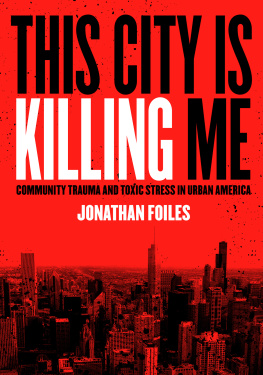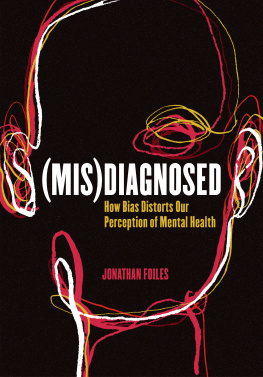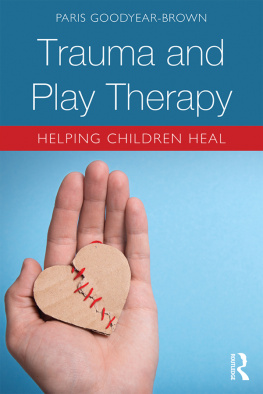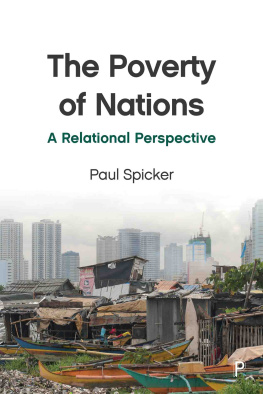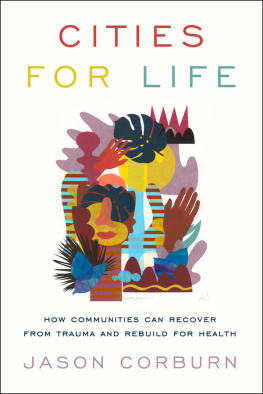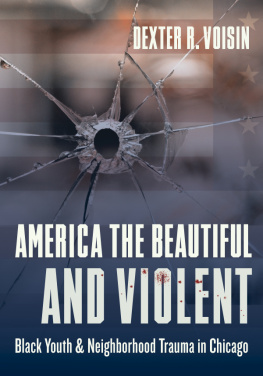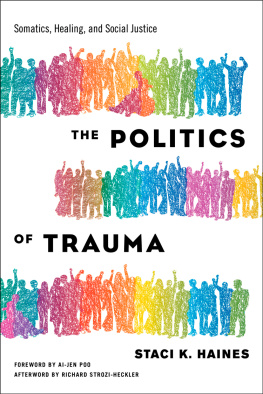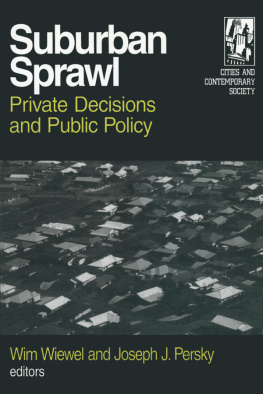
THIS CITY IS KILLING ME
THIS CITY IS KILLING ME
Community Trauma and Toxic Stress in Urban America
Jonathan Foiles

Belt Publishing
Copyright 2019 by Jonathan Foiles
All rights reserved. This book or any portion thereof may not be reproduced or used in any manner whatsoever without the express written permission of the publisher except for the use of brief quotations in a book review.
Printed in the United States of America
First edition 2019
ISBN: 978-1-948742-47-4

Belt Publishing
3143 West 33rd Street, #6
Cleveland, Ohio 44109
www.beltpublishing.com
Book design by Meredith Pangrace
Cover by David Wilson
For ESF
But the poor person does not exist as an inescapable fact of destiny. His or her existence is not politically neutral, and it is not ethically innocent. The poor are a byproduct of the system in which we live and for which we are responsible. They are marginalized by our social and cultural world. They are the oppressed, exploited proletariat, robbed of the fruit of their labor and despoiled of their humanity. Hence the poverty of the poor is not a call to generous relief action, but a demand that we go and build a different social order.
Gustavo Gutirrez
It is a joy to be hidden and a disaster not to be found.
Donald Winnicott
CONTENTS:
INTRODUCTION
Do you think you can keep yourself safe?
Jacqueline has been in my office for about ten minutes. The tears shes kept choked back begin to flow down her cheeks. She shakes her head no and looks down at the floor. Shes been my patient for a little over a year, and in that time shes been hospitalized about once a month. This is the first time shes shown me the depths of her pain; usually her family brings her into the ER after they find a razor blade stashed under her bed or discover her with a rope around her neck.
I begin to fill out the required paperwork while thanking Jacqueline for being honest with me and praising her recovery. She asks if she can call her family. I say yes, of course, and even though I dont speak Spanish I can guess how the conversation is going. Jacqueline speaks in hushed tones. The voice on the other end sounds frazzled, almost angry. I write down in detail when she told me she wanted to kill herself, how she plans to do it, the number of times shes tried before. After a few minutes were both ready. I put on my coat, and together we walk from the outpatient clinic where I work to the main hospital building across the street.
Jacqueline and I have been meeting weekly, and weve developed a good working relationship. Its hard for me to see her down like this, although I admire her vulnerability. According to Freud Im supposed to be committed to neutrality and work to contain my own wish to see Jacqueline happy again. I also remember that Freuds case notes show that he didnt practice this himself, so I decide to plunge ahead and tell her something thats been on my mind lately.
You know, Jacqueline. I do have some news. My wife is pregnant.
Shes the first patient Ive told. My wife is now safely outside of the first trimester, so I no longer feel as worried by the possibility of a miscarriage. Jacquelines face lights up instantly.
She is? Oh my God, thats so wonderful! I know youre going to be such a great father.
The smile remains on her face as we walk into the ER, even though Ive just signed an affidavit swearing that she is at imminent risk of harm. I motion her to one of the vinyl couches in the waiting room while I speak with the charge nurse, and once I am finished we sit next to one another. The television in the corner silently flashes the days news. I show her ultrasound pictures on my cell phone while we wait for her name to be called.
The day on which I hospitalized Jacqueline was in many ways an ordinary day. I work as a therapist at a community mental health clinic on Chicagos West Side. I started out as a case manager working with adults experiencing homelessness who also had a serious mental illness. Case management gives you a crash course in the inadequacies of our social safety net, but aside from filling out paperwork and making calls I also got to learn about my clients lives over cups of bad fast food coffee. I quickly figured out that this is what I enjoyed the most. These experiences led me to become a therapist. The clinic where I work is the outpatient psychiatric department of a safety net hospital on the West Side of Chicago. After Jacqueline was admitted, I went back across the street to the clinic and saw six other patients the same day, all with varying levels of need.
The movement to create clinics like the one where I work began in 1963 when President Kennedy signed the Community Mental Health Act. This act delegated federal funds to build community mental health centers across the country, a notable shift away from the institutional model of years prior. Kennedys sister Rosemary underwent a forced lobotomy in 1941 that left her with the intellectual capacity of a two-year-old. I like to think that Kennedy had this in mind when he offered an alternative, humane way to treat those with mental illness.
The actual law was rather toothless and didnt lead to many notable outcomes, but it played a key symbolic role in the deinstitutionalization movement in the United States. Psychopharmacology had begun to advance beyond what was largely a guessing game into something that resembled a science. Fourteen antipsychotic medications were developed in the United States between 1954 and 1975. These drugs were far from perfect; the earliest antipsychotics could induce irreversible Parkinsonian-like tremors and cause patients to have a need to be in constant motion (known as akathisia). Iproniazid was later found to cause liver damage and removed from the market. Nevertheless, deinstitutionalization proceeded rapidly, and while the movement should rightly be criticized for sending many patients from a bed and into homelessness, the asylums which went out of business were awful places much prone to abuse that did little to ease the suffering of those confined there.
As persons with serious mental illness were increasingly encouraged to live in their communities, the need for robust outpatient mental health services based in the community increased. Unfortunately, the growth and availability of such services did not proceed nearly as rapidly as the pace of deinstitutionalization, and the gaps in care continue to the present day. For those states with the poorest options for mental health care, providers (social workers like myself, counselors, psychiatrists, psychologists, and psychiatric nurse practitioners) would have to treat six times as many patients as those in well-funded states. Of course this is impossible, so instead people are forced to do without.
In Alabama, for instance, there is one mental health professional per 1,260 residents.
In this book I will focus on Chicago because its what I know best, but there is no state, no city in America that does an adequate job taking care of its citizens with mental illness. Access to mental health services in Chicago, like so many other things, depends upon your ZIP code. If you live in one of the richest neighborhoods, such as the Gold Coast, there are 4.41 mental health professionals per 1,000 residents. Travel to the Southwest Side where I work and that figure drops to 0.17. But it hasnt always been like this. In the 1960s and 1970s the city had nineteen community mental health centers spread across the city. Various mayoral administrations chipped away at this until the city was left with twelve. Then came Rahm Emanuel.
Next page
